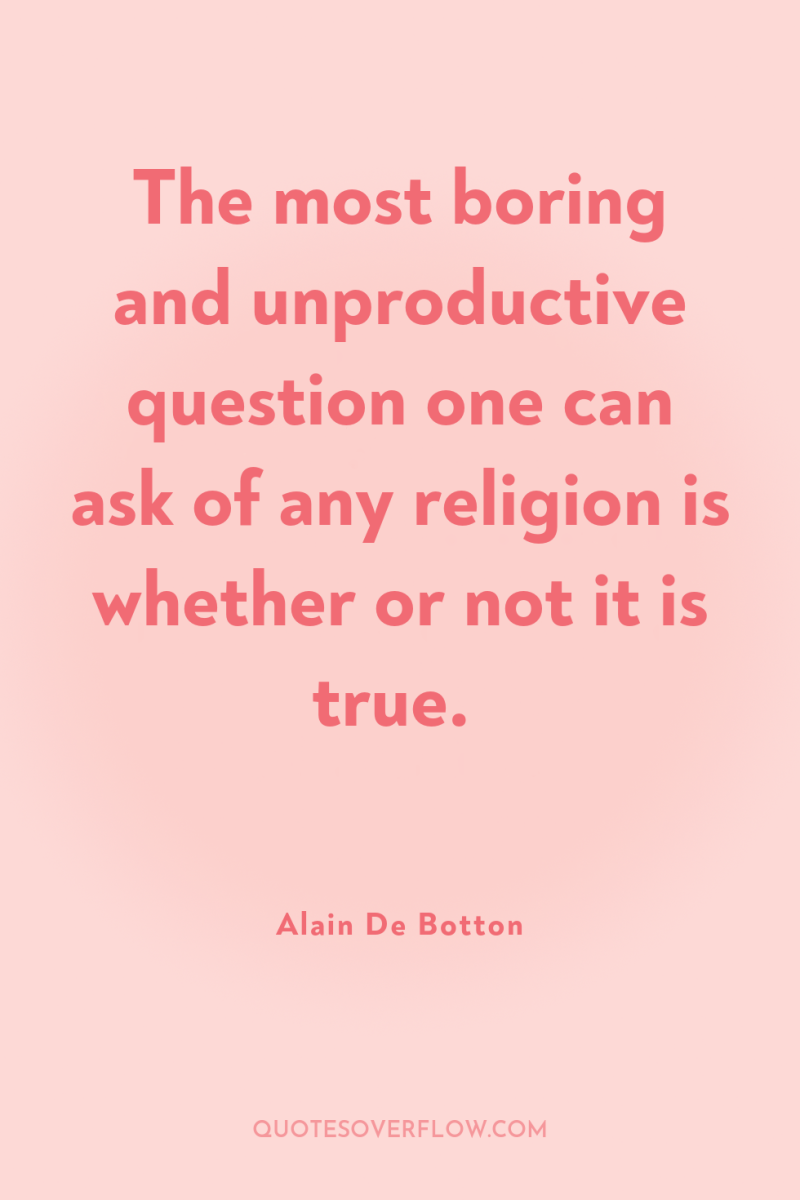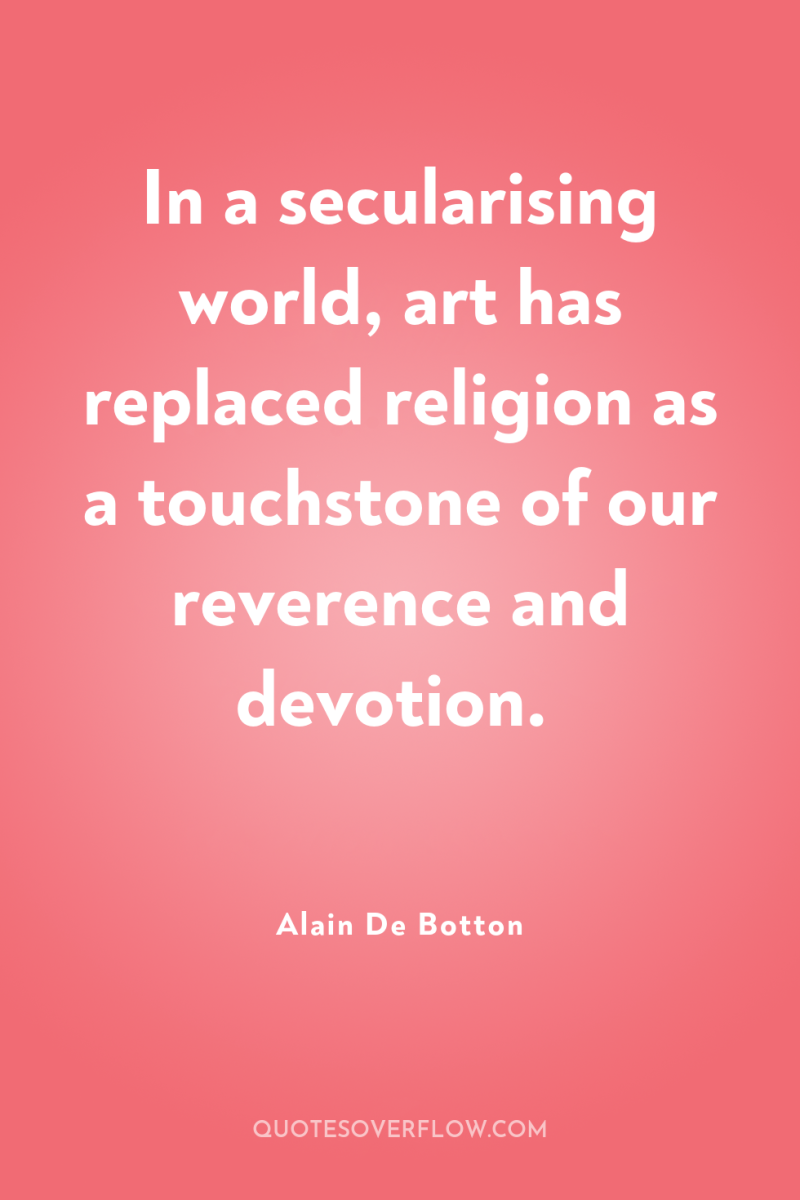
1
The most boring and unproductive question one can ask of any religion is whether or not it is true.Alain De Botton
2
I never wavered in my certainty that God did not exist. I was simply liberated by the thought that there might be a way to engage with religion without having to subscribe to its supernatural content - a way, to put it in more abstract terms, to think about Fathers without upsetting my respectful memory of my own father. I recognized that my continuing resistance to theories of an afterlife or of heavenly residents was no justification for giving up on the music, buildings, prayers, rituals, feasts, shrines, pilgrimages, communal meals and illustrated manuscripts of the faiths.Alain De Botton
3
It is hope--with regard to our careers, our love lives, our children, our politicians, and our planet--that is primarily to blame for angering and embittering us. The incompatibility between the grandeur of our aspirations and the mean reality of our condition generates the violent disappointments which rack our days and etch themselves in lines of acrimony across our faces.Alain De Botton

4
In a secularising world, art has replaced religion as a touchstone of our reverence and devotion.Alain De Botton
5
It is one of the unexpected disasters of the modern age that our new unparalleled access to information has come at the price of our capacity to concentrate on anything much. The deep, immersive thinking which produced many of civilization's most important achievements has come under unprecedented assault. We are almost never far from a machine that guarantees us a mesmerizing and libidinous escape from reality. The feelings and thoughts which we have omitted to experience while looking at our screens are left to find their revenge in involuntary twitches and our ever-decreasing ability to fall asleep when we should. .Alain De Botton
6
As victims of hurt, we frequently don't bring up what ails us, because so many wounds look absurd in the light of day.Alain De Botton
7
We seem to be unable to resist overstating every aspect of ourselves: how long we are on the planet for, how much it matters what we achieve, how rare and unfair are our professional failures, how rife with misunderstandings are our relationships, how deep are our sorrows. Melodrama is individually always the order of the day.Alain De Botton
8
There is a devilishly direct relationship between the significance of an idea and how nervous we become at the prospect of having to think about it.Alain De Botton
9
We continue to need exhortations to be sympathetic and just, even if we do not believe that there is a God who has a hand in wishing to make us so. We no longer have to be brought into line by the threat of hell or the promise of paradise; we merely have to be reminded that it is we ourselves -- that is, the most mature and reasonable parts of us (seldom present in the midst of our crises and obsessions) -- who want to lead the sort of life which we once imagined supernatural beings demanded of us. An adequate evolution of morality from superstition to reason should mean recognizing ourselves as the authors of our own moral commandments.Alain De Botton
10
It is the most ambitious and driven among us who are the most sorely in need of having our reckless hopes dampened through immersive dousings in the darkness which religions have explored. This is a particular priority for secular Americans, perhaps the most anxious and disappointed people on earth, for their nation infuses them with the most extreme hopes about what they may be able to achieve in their working lives and relationships.Alain De Botton
11
Differ though we might with Christianity's view of what precisely our souls need, it is hard to discredit the provocative underlying thesis, which seems no less relevant in the secular realm than in the religious one--that we have within us a precious, childlike, vulnerable core which we should nourish and nurture on its turbulent journey through life.Alain De Botton
12
Being put in our place by something larger, older, greater than ourselves is not a humiliation; it should be accepted as a relief from our insanely hopeful ambitions for our lives.Alain De Botton
13
In our more arrogant moments, the sin of pride–or superbia, in Augustine's Latin formulation–takes over our personalities and shuts us off from those around us. We become dull to others when all we seek to do is assert how well things are going for us, just as friendship has a chance to grow only when we fare to share what we are afraid of and regret. The rest is merely showmanship. The flaws whose exposure we so dread, the indiscretions we know we would be mocked for, the secrets that keep our conversations with our so-called friends superficial and inert–all of these emerge as simply part of the human condition. .Alain De Botton
14
Whatever modern democracies may tell themselves about their commitment to free speech and to diversity of opinion, the values of a given society will uncannily match those of whichever organizations have the scale to pay for runs of thirty-second slots around the nightly news bulletin.Alain De Botton
15
[T]he unsympathetic assessments we make of others are usually the result of nothing more sinister than our habit of looking at them in the wrong way, through lenses clouded by distraction, exhaustion and fear, which blind us to the fact that they are really, despite a thousand differences, just altered versions of ourselves: fellow fragile, uncertain, flawed beings likewise craving love and in urgent need of forgiveness.Alain De Botton